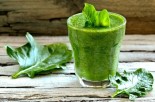It makes sense that the healthier you eat, the longer you'll live. But, do you know just how big of an impact your diet has on longevity?
Michael Greger, author of the new book, How Not to Die, and founder of the non-profit website, NutritionFacts.org, joins Dr. Susanne to share which foods he puts in his "daily dozen," as well as why exercise, along with proper nutrition, is the key to living a long, healthy, happy life.
At the top of Dr. Greger's list is dark green leafy vegetables, which have a higher nutrient density than any other food. These veggies add years to your life and life to your years.
Legume intake may be the most important dietary predictor of survival in older people from around the globe, with an eight percent reduction in risk of premature death for every one-ounce increase in daily intake. Sadly 96% of Americans don’t even reach the minimum recommended intake of three servings a week. Dr. Greger is more inclined to agree with the American Institute for Cancer Research’s suggestion of three servings a day; beans, split peas, chickpeas or lentils with every meal.
Don't forget the exercise factor. The science to date shows that 90 minutes a day is the optimal amount of time for an individual to work out. Sedentary behavior, especially for more than six hours a day, is one of the biggest factors of early death.
What four foods should you always buy and four foods you should never buy when you visit the grocery store?
Dr. Greger is a big fan of convenience, so canned beans, fresh fruit, and bags of frozen greens and frozen berries are always on his shopping list. The worst things you can eat are trans fats and processed meats, so he advises to stay away from processed foods that contain hydrogenated oils like many margarines or canned frosting, as well as lunch meats and hot dogs.
Listen in as Dr. Greger explains more about why nutrition and exercise are the key factors for health and longevity, as well as specific examples of the most important foods you should be eating.

Dr. Greger's Daily Dozen: Foods that Can Save Your Life
Guest
Info & Links: Michael Greger, MD
From the Show: Wellness for Life
Summary: Do you know how big of an impact your diet has on longevity?
Guest Bio: Michael Greger, MD
 Michael Greger, MD, FACLM, is a physician, New York Times bestselling author, and internationally recognized professional speaker on a number of important public health issues. Dr. Greger has lectured at the Conference on World Affairs, the National Institutes of Health, and the International Bird Flu Summit, among countless other symposia and institutions; testified before Congress; has appeared on shows such as The Colbert Report and The Dr. Oz Show; and was invited as an expert witness in defense of Oprah Winfrey at the infamous "meat defamation" trial. Currently, Dr. Greger proudly serves as the Director of Public Health and Animal Agriculture at the Humane Society of the United States.
Michael Greger, MD, FACLM, is a physician, New York Times bestselling author, and internationally recognized professional speaker on a number of important public health issues. Dr. Greger has lectured at the Conference on World Affairs, the National Institutes of Health, and the International Bird Flu Summit, among countless other symposia and institutions; testified before Congress; has appeared on shows such as The Colbert Report and The Dr. Oz Show; and was invited as an expert witness in defense of Oprah Winfrey at the infamous "meat defamation" trial. Currently, Dr. Greger proudly serves as the Director of Public Health and Animal Agriculture at the Humane Society of the United States.Dr. Greger's recent scientific publications in the American Journal of Preventive Medicine, Biosecurity and Bioterrorism, Critical Reviews in Microbiology, Family & Community Health, and the International Journal of Food Safety, Nutrition, and Public Health explore the public health implications of industrialized animal agriculture.
Dr. Greger is also licensed as a general practitioner specializing in clinical nutrition and is a founding member and Fellow of the American College of Lifestyle Medicine. He was featured on the Healthy Living Channel promoting his latest nutrition DVDs and honored to teach part of Dr. T. Colin Campbell's esteemed nutrition course at Cornell University. Dr. Greger's nutrition work can be found at NutritionFacts.org, which is now a 501(c)3 nonprofit charity.
He is the author of Bird Flu: A Virus of Our Own Hatching and Carbophobia: The Scary Truth Behind America's Low Carb Craze. His latest book, How Not to Die, became an instant New York Times Best Seller. Dr. Greger is a graduate of the Cornell University School of Agriculture and the Tufts University School of Medicine.
- Organization: Nutrition Facts
- Book Title: How Not to Die
- Guest Website: Michael Greger, MD
- Guest Twitter Account: @nutrition_facts
Tagged under
RadioMD is now
We’re rebranding and expanding!
RadioMD is joining forces with our new platform, PodcastHealth.com — your all-in-one destination for the best health, wellness, fitness, and medical podcasts.
A fresh new experience designed to help you discover, follow, and enjoy more trusted health content.
All Health Podcasts. All in one place.
Discover what’s new → PodcastHealth.com





